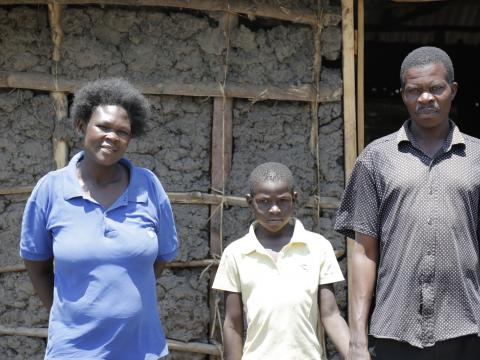More Than Hope, Mobile Cash Transfer Provides Financial Inclusion for Family

Susan Otieno, World Vision Communications Officer, Kenya
John and his wife, Judith, are still recovering from the turmoil caused by floods in their lives two years ago.
As a hired motorcycle taxi (bodaboda) rider, John is paid on commission for services offered. For the last five years, the couple – residing in Katito (Kisumu County) - has been cultivating maize and vegetables on a hired parcel of land for home consumption. They sell the surplus to increase family income.
On average, the family harvests at least seven sacks of maize, which lasts them approximately six months. However, in 2018, Judith and John harvested nothing after their farm was entirely destroyed by floods.
“All our crops were destroyed and getting food was a problem. Also, water had begun destroying the walls of our house from the bottom,” said 40-year-old John.

“It was bad. People would even light cooking fires from stoves placed on tables as the floor was wet and filled with water. I even considered leaving my husband temporarily and going to my parents’ home. But I stayed,” said 33-year-old, Judith.
Eventually, the couple was forced to move to an evacuation centre where they stayed for about three months with their three children.
While there, they learnt that World Vision Kenya was offering cash through a mobile phone money application (MPESA) to families worst hit by the floods.
To ensure smooth delivery of the cash, a Help Desk and Complaints Committee was set up. Its members were chosen by the community.
They took part in the identification, selection and registration of most affected families to benefit from the finances. They also handled arising complaints.
George, a member of one of the Help Desk Committees explained that the money was unconditional and its beneficiaries were at will to use it in whichever way they thought best.
John received a total of 13,400 Kenya Shillings (USD$134) from this initiative, which was sponsored by World Vision through funding from US donors.
“I bought iron sheets since my house was in a bad state and needed repairs. I also gave my wife some money to buy food. Then we agreed to buy a goat,” said John.
“Livestock is like our bank. You take care of the animals and they will reproduce. When we have needs, we’ll sell them and get cash. I have children going to high school next year and I know I will need money. This will help us a lot!”

“In the past, we used to get relief food from the government and World Vision whenever we were affected by disasters. But this time, we received money. And this is much better because we can make the best decision on how to use it,” John noted.
Maurice Adia the Senior Assistant Chief of Gem-Rae Sub-location in Kisumu County noted that the cash transfers given by World Vision Kenya benefitted hundreds of people who had been affected by floods in the area.
“Almost every year, we experience death and destruction of property caused by floods. The affected people usually come to us crying for help. World Vision never disappoints; the team is always fast to respond."
Learn more about our other disaster management projects here.